The wolf is a powerful and enigmatic creature that has played an important role in Chinese culture for centuries. Throughout history, the wolf has been associated with various symbolic meanings and has been featured in many forms of Chinese art, literature, and folklore.
do wolves live in china?
Wolves can be found in China. Where do wolves live in China? In several provinces, including Heilongjiang, Jilin, and Liaoning in the northeast, and Shaanxi, Gansu, and Qinghai in the northwest. Wolves can be found living in the woods, on the plains, and in the mountains.
Once common throughout China, wolf populations have since suffered from habitat loss, hunting, and human-wildlife conflict. The Chinese government has established nature reserves and regulated hunting and trapping to protect the remaining wolf populations and their habitats in modern times. To ensure the survival of the wolf population in China, however, continued conservation efforts are required despite these successes.
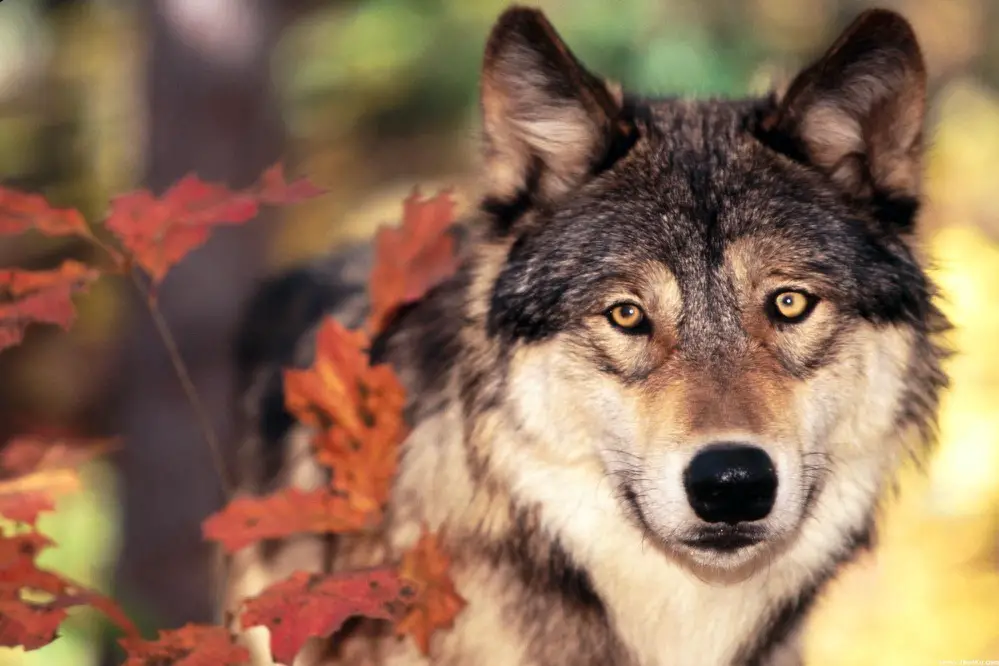
what kinds of wolf live in china
There are two subspecies of wolves that are found in China – the Gray Wolf (Canis lupus) and the Tibetan Wolf (Canis lupus chanco).
The Gray Wolf is the more common subspecies of wolf in China, and it is found in several regions across the country, including the northeast and northwest. The Gray Wolf is the largest wild member of the Canidae family, and it has a thick fur coat that can vary in color from gray to black, with some individuals having a reddish or brown tint. Gray wolves are known for their strength, intelligence, and social behavior, and they typically hunt in packs.
The Tibetan Wolf, also known as the Himalayan Wolf, is a slightly smaller subspecies of wolf that is found in high-altitude regions across China, Tibet, and neighboring countries such as Nepal and India. Tibetan Wolves have a thick, woolly coat that is often gray or brown, with a distinctive black patch on their shoulders. Tibetan Wolves are known for their resilience and ability to survive in harsh environments, and they are often found in areas with low prey densities.
Both Gray Wolves and Tibetan Wolves are considered endangered species in China, and they are protected by the Chinese government. Despite this, they continue to face threats such as habitat loss, hunting, and human-wildlife conflict, which has contributed to their declining populations.
wolf in chinese culture
Wolves have played an important role in Chinese culture for centuries and are featured prominently in Chinese art, literature, and folklore. The wolf is a symbol of strength, power, loyalty, and teamwork, and it is associated with various spiritual and mystical beliefs in Chinese culture.
There are wolves in northern China, which symbolize cruelty, greed, and plunder. People use the term “wolf heart” to describe someone who is cruel, and “like a tiger and wolf” to describe someone who is greedy. “Wolf eyes” can evoke distrust or fear. There is a saying that goes, “Better to kill ten tigers than one wolf.” This is because tigers generally operate alone, while wolves hunt in groups. If one wolf is killed, the others will retaliate. Among the Turkic people, the wolf is a sacred animal and is even regarded as the ancestor of the ethnic group. It is said that Genghis Khan’s ancestor was a gray male wolf and a white female deer. The flag of the Turkic tribes features a wolf head or a symbol representing a wolf head.
Wolf Culture:
The so-called “wolf culture” refers to the unique and outstanding initiative in corporate culture, which embodies a wild fighting spirit. The nature of the wolf is wild, ruthless, greedy, and violent. These characteristics should be reproduced in team culture, and one should have a “greedy” attitude towards work and career, endlessly striving and exploring.
Introduction to Wolf Culture:
The “ruthless” aspect of wolf nature in work means to overcome difficulties one by one and mercilessly eliminate them. The “wild” aspect of wolf culture refers to the spirit of fighting relentlessly in work and career development. The “greedy” aspect of wolf culture refers to the tireless pursuit of work and career. The “violent” aspect of wolf culture refers to the need to treat each difficult situation roughly and not show mercy.
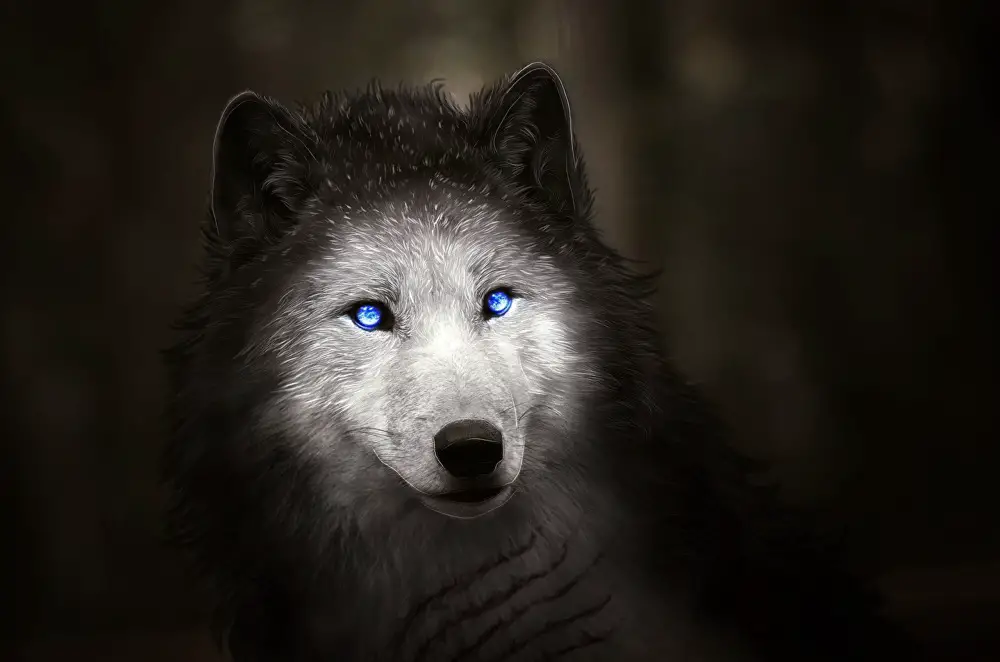
wolf symbol in china
In Chinese culture, the wolf is a symbol of several different qualities and ideas. Some of the most prominent wolf symbols in China include:
Strength and Power: The wolf is often associated with strength and power in Chinese culture. The animal’s ferocity and hunting prowess are seen as evidence of its physical and mental strength, which is why the wolf is often depicted in Chinese art and literature as a symbol of these qualities.
Loyalty and Teamwork: Wolves are social animals that live and hunt in packs, and this behavior has led to the animal being associated with loyalty and teamwork in Chinese culture. The concept of “wolf culture” is often used to describe the idea of working together in a group to achieve a common goal, just as wolves do in their pack.
Protection and Guardianship: In some Chinese traditions, the wolf is seen as a guardian spirit that protects and watches over the natural world. This belief is based on the wolf’s reputation as a fierce and powerful animal that is capable of defending its territory and its pack.
Independence and Resourcefulness: The wolf is also associated with independence and resourcefulness in Chinese culture. Wolves are known for their ability to survive in harsh environments and for their ingenuity when it comes to hunting and foraging for food. These qualities are seen as valuable in Chinese society, where self-sufficiency and self-reliance are highly prized.
Overall, the wolf symbol in China is multifaceted and can represent different ideas depending on the context. Whether it is associated with strength and power, loyalty and teamwork, protection and guardianship, or independence and resourcefulness, the wolf remains an important and highly respected animal in Chinese culture.
wolf teeth meaning in chinese culture
In Chinese culture, wolf teeth are believed to have both spiritual and practical significance. Here are some of the meanings associated with wolf teeth in Chinese culture:
Protection: In some traditions, wolf teeth are seen as a symbol of protection against evil spirits and negative energy. Wearing or carrying wolf teeth is believed to provide a form of spiritual protection to the wearer.
Strength and Power: Wolf’s teeth are also associated with strength and power, just like the animal itself. Some people believe that possessing a wolf tooth can imbue the wearer with these qualities, making them more assertive, confident, and successful in their endeavors.
Luck and Prosperity: In some parts of China, it is believed that carrying a wolf tooth can bring good luck and prosperity to the wearer. This belief is based on the idea that the wolf is a symbol of strength and perseverance, which are qualities that can help a person achieve success and wealth.
Medical Benefits: In traditional Chinese medicine, wolf teeth are believed to have medicinal properties. It is said that the teeth can be ground into a powder and used to treat various ailments, including toothaches, headaches, and rheumatism.
It’s worth noting that these beliefs and meanings are not universally held in China and may vary depending on the region and cultural context. Nonetheless, the symbolism of wolf teeth in Chinese culture demonstrates the animal’s enduring importance and cultural significance.

wolf in Chinese mythology
Wolves play an important role in Chinese mythology, where they are often depicted as powerful and mystical creatures with supernatural abilities. Here are some examples of the role of wolves in Chinese mythology:
The Nine Sons of the Dragon: In Chinese mythology, the Nine Sons of the Dragon are a group of mythical creatures that are believed to have been fathered by the Dragon King. One of the nine sons is the wolf, which is depicted as a fierce and powerful creature with supernatural strength and agility.
The Moon and Tides: In some Chinese myths, the wolf is associated with the moon and is believed to have the power to control the tides and influence the forces of nature. According to these myths, the howling of wolves can cause the tides to rise and fall, and the moon’s power is said to be amplified when wolves are present.
The White Wolf of Divine Mountains: In Chinese mythology, the White Wolf of Divine Mountains is a legendary creature that is said to live in the mountains and possess magical powers. The wolf is believed to be able to control the weather and to have the ability to shape-shift into different forms.
Overall, wolves in Chinese mythology are associated with power, magic, and the forces of nature. They are depicted as powerful and mystical creatures that possess supernatural abilities and are respected and revered in Chinese culture.
Chinese wolf god
- The Dragon has nine sons, which are respectively the Dragon with its mother, the Wolf, the Great Bird, the Toad, the Lion, the Tortoise, the Tiger, and the Fish.
Dragon and Wolf gave birth to Yazi.
Yazi is the offspring of the union between the Dragon and the Wolf. It is said that its character is quite fierce, inheriting the natural characteristics of the Wolf. This highlights the importance of a mother’s role in her child’s upbringing.
2. Kuimu Lang, also known as Kui Xing, is one of the twenty-eight constellations in ancient Chinese mythology. In the novel “Journey to the West,” he is a powerful deity who later descends to earth and becomes the master of the Bo Moon Cave, known as the Yellow Robe Monster. Originally a wolf, he attained enlightenment and transformed into a human form, earning his position as a celestial star in the heavens. However, after descending to earth, he had an unattractive appearance and was referred to as the Yellow Robe Monster due to the yellow robe he wore.
yin yang wolf
The concept of yin and yang in Chinese philosophy is often represented by a symbol of a circle divided into two halves, one black (yin) and the other white (yang), with a smaller circle of the opposite color within each half. The symbol represents the complementary and interconnected nature of opposing forces and how they give rise to each other.
The wolf is sometimes associated with yin and yang in Chinese culture because it represents both positive and negative aspects. In traditional Chinese beliefs, the wolf is seen as a symbol of loyalty, intelligence, and courage, but also of cruelty and brutality.
Some artists and designers have created images of wolves that incorporate the yin and yang symbol, perhaps to represent the balance and harmony of these seemingly contradictory qualities. These images often show a wolf split down the middle, with one half white and the other black, or with one side of the body in the shape of the yin symbol and the other in the shape of the yang symbol.
wolf in feng shui
In Feng Shui, the wolf is sometimes considered a symbol of protection and strength. It is believed that placing an image of a wolf in the home or workplace can help to ward off negative energy and protect against harm. The wolf is also associated with the element of water, and can be used in Feng Shui cures to balance and harmonize water energy in a space.
In traditional Feng Shui, it is important to use symbols and objects that are meaningful to the individual and resonate with their personal energy. Therefore, the significance of the wolf in Feng Shui may vary depending on the individual’s cultural and personal associations with the animal.
Wolf in Buddhism
The wolf is the mount of the God of Fury in Chinese mythology. In Buddhism, the wolf is the mount of the God of the Outdoors. The God of Fury is a celestial being, and Wolf Ancestor is its mount. Fury God and Kunlun Mountain are also closely related.
Wolf in Chinese Medicine
In Chinese medicine, wolf parts have been used for their medicinal properties for centuries. The use of wolf-derived medicines is based on the concept of “yang” in traditional Chinese medicine, which refers to the body’s vital energy and warmth.
Wolf parts that are commonly used in Chinese medicine include wolfberry (also known as goji berry), which is believed to have anti-aging and immune-boosting properties. Other parts, such as wolf teeth and bones, are believed to have tonic and healing effects on the kidneys and bones.
However, it is important to note that the use of wolf parts in traditional Chinese medicine is controversial and has raised ethical concerns, as it has contributed to the decline of wolf populations in some areas. It is important to seek guidance from a qualified healthcare professional and ensure that any medicines derived from wildlife are ethically and sustainably sourced.
why is the wolf not in the 12 Chinese zodiac
The Chinese zodiac, or Shengxiao, is a cycle of 12 years, with each year represented by an animal sign. These 12 animal signs are the rat, ox, tiger, rabbit, dragon, snake, horse, goat, monkey, rooster, dog, and pig.
The selection of these 12 animal signs is based on various cultural and mythological factors, including the animals’ significance in ancient Chinese culture, the animals’ role in agriculture and hunting, and their symbolic meanings.
While the wolf has been an important animal in Chinese culture and mythology, it was not included in the Chinese zodiac. One possible reason for this is that the wolf was traditionally seen as a fierce and dangerous predator, and was not as commonly domesticated or used for agricultural purposes as other animals such as the ox, horse, or goat. Additionally, the selection of the 12 animal signs may have been influenced by the lunar calendar, which has 12 months in a year, rather than by the cultural significance of individual animals.
wolf totem of Chinese grassland ethnic groups
The wolf is an important totem in the traditional culture of many grassland ethnic groups in China, such as the Mongolian, Tibetan, and Kazakh peoples. These groups have a strong connection to the grasslands and the wildlife that inhabit them, including the wolf.
In these cultures, the wolf is often seen as a symbol of strength, courage, and loyalty. It is believed that the wolf is a powerful and intelligent animal that can help humans in many ways, including protecting livestock from predators and guiding people through the wilderness.
The wolf is also considered a spiritual animal that can help connect humans to the natural world and to their ancestors. In traditional Mongolian culture, for example, it is believed that the wolf is the spiritual ancestor of the Mongolian people, and that a person who dreams of a wolf has been visited by their ancestor in wolf form.
The wolf totem is celebrated in many traditional grassland festivals, such as the Mongolian Naadam festival and the Kazakh Eagle Festival. These festivals often include traditional sports and games that showcase the strength and agility of both humans and animals, including wolf hunting and horse racing.
The wolf totem is a totem of Turkic ethnic groups. The ancient Turkic tribe Gaoche believed that they were descendants of a beautiful Hun princess and a wolf. The ancestors of the Wusun were said to be descendants of an abandoned baby and a she-wolf named Ashina. Both the Wusun and Gaoche were fostered by the Xiongnu, and both have wolf ancestral myths. By extension, the Xiongnu may also have had wolf ancestral myths, but they have disappeared into the distant past.
The royal clan of the First Turkic Khaganate took the surname Ashina from the she-wolf Ashina in Turkic mythology. The word Ashina in ancient Turkic language means “grey wolf’s eye.”
Guangxi Wolf soldiers
Wolf soldiers, also known as “Liang Bing” in Chinese, originated in the mid-Ming Dynasty as a local militia formed by the Zhuang ethnic chieftains. The army was primarily composed of the Guangxi Wolf people. The Wolf soldiers of Guangxi have written a glorious page in the ancient Chinese military history with their loyalty and devotion to defending their homeland. The Zhuang people were known as “Liangren” in the Ming Dynasty, and the term “Liang Bing” was derived from the pronunciation of “Liangren”. Some scholars believe that the term “Wolf” is ambiguous and insist on using “Liang Bing”.
The Wolf soldiers were mainly distributed in the northwest of Guangxi and some parts of southern Guizhou. They were called “Wolf soldiers” due to their brave combat skills. During the Ming Dynasty, the imperial court dispatched Wolf soldiers to the Jiangsu and Zhejiang regions to fight against Japanese pirates and suppress the Guangxi Yao uprising. After the war, the Wolf soldiers were sent by the court to garrison and settle in some remote mountain areas and transportation hubs in Guiping.
During the Qing Dynasty, the Wolf soldiers were mainly used to assist the imperial army in escorting prisoners.
Chinese wolf warrior diplomacy
When the Chinese government talks about “wolf warrior diplomacy,” they’re referring to a more forceful and confrontational approach to international relations. Wolf Warrior is a term borrowed from a series of popular Chinese action films about Chinese soldiers who bravely fight off foreign invaders. The previous Chinese diplomatic policy of “keeping a low profile” and staying out of the affairs of other countries has been contrasted with this new approach.
Chinese diplomats have become more aggressive and outspoken in recent years in their efforts to defend China’s interests and project Chinese power abroad. China’s response to what it sees as slights or criticism has included increased use of economic coercion and “soft power” tactics in an effort to sway the opinions of other nations.
Others have criticised China’s “wolf warrior diplomacy” as being too aggressive and harmful to China’s long-term interests, while proponents of the strategy have lauded it as a more assertive and effective approach to foreign policy.
The Story of the Wolf in china
white-eyed wolf
Legend has it that in ancient times, a person brought home an animal from the mountains, thinking it was a small dog. The owner loved and cared for it, and gradually raised it. Later, the owner noticed a distinctive feature of the animal: its eyes were triangular and often showed the whites of its eyes, but the owner didn’t think much of it.
Finally, one night, the owner heard a strange sound and discovered that the white-eyed wolf had eaten his child. By the time he realized what had happened, it was too late, so the owner killed the wolf in anger. This is the origin of the white-eyed wolf. Therefore, people use the white-eyed wolf to describe those who forget kindness and repay kindness with enmity. The white-eyed wolf is perhaps the most famous wolf in Chinese history!
Mr. Dongguo and the wolf” or “The story of Mr. Dongguo and the wolf-the wolf of zhongshan
The story of Mr. Dongguo and the Wolf is well-known in China. It tells of how Mr. Dongguo saved a wolf, only to be eaten by the wolf in the end. This story serves as a warning to people not to associate with those who are inherently bad, no matter how well they disguise themselves as friendly and kind. In the end, their true nature will be revealed, causing harm to themselves and others. This story has become deeply ingrained in people’s hearts, making Mr. Dongguo and the Wolf one of the most famous wolf stories.
Wolf in Strange Stories from a Chinese Studio
In the book “Strange Stories from a Chinese Studio”, there is a story about a woodcutter who encountered two wolves while chopping wood on the mountain. The man was very afraid, so he slowly backed away, but the two wolves kept following him. The woodcutter had no choice but to stand still and confront the two wolves. One wolf crouched in front of the woodcutter and was about to fall asleep, which made the woodcutter relax his guard. However, he suddenly felt something was wrong, as the other wolf had circled around behind him. The woodcutter quickly jumped up, killed the wolf behind him, and then ran away.
The Farmer and the Wolf
In ancient times, there was a farmer who, after finishing his work in the field, saw a wolf with its limbs broken. Feeling sorry for it, the farmer took it home and nursed it back to health. However, as the family became increasingly impoverished, they eventually ran out of food to eat, and the wolf ended up eating the farmer. This story is also well-known, and so the wolf in this tale is also famous.
Wolf smoke in china
Wolf smoke is a smoke signal ignited by ancient Chinese border soldiers on watchtowers to warn of enemy movements, using firewood as fuel. Although it is called “wolf smoke,” it is not actually made from wolf dung. Collecting enough wolf dung for fuel would be difficult, and the smoke produced by burning wolf dung does not rise straight up.
So why did ancient people refer to these signal fires as “wolf smoke”? The wolf was a totem revered by ethnic minorities such as the Xiongnu, the Turkic peoples, and the Tubo kingdom. Their armies were known as “wolf soldiers” and their rulers were called “wolf lords” by the Chinese people. Therefore, it was natural for ancient people to call the signal fires lit to alert against invasions by these peoples “wolf smoke.”
“Almost all of the yellow sheep wool and lamb wool can be found in wolf dung, without any bone fragments except for teeth and calcium carbonate, which acts like lime powder to stick the wool together. The digestive capacity of the wolf is incredibly strong and can fully digest all the sheep meat, skin, bones, and tendons that they swallow, leaving almost no residue, except for wool fibers and rodent teeth that cannot be digested. Even the wool they consume is only rough wool fibers, while fine wool and cashmere have been digested. Burning wolf dung is like burning sheep felt, emitting light brown smoke, which is lighter than the smoke produced by burning dry wood piles.
However, in the culture of ethnic minorities, especially in the northwest region of China, the wolf is indeed revered as their ancestor. According to historical records, the wolf totem revered by the Xiongnu people is one of the most compelling pieces of evidence.
During the Tang Dynasty, the Tubo kingdom also revered the wolf as their national god, so the Tang Dynasty called them “wolf Tubo.” Thus, burning wolf smoke signaled an invasion of foreign enemies and foretold impending border warfare.
Wolf smoke, as an important ancient military communication method, continued to be used during the Ming and Qing dynasties. It effectively and timely assisted the country in resisting invasions by foreign forces and made significant contributions to the nation.
Why is there a legend that wolf smoke is made by burning wolf dung?
The legend that wolf smoke is made by burning wolf dung was originally proposed by Western scholars studying economic principles. After some false evidence, it was discovered that if all the wolf smoke lit on the Great Wall was ignited by wolf dung, searching for enough dung to produce it would have been a huge undertaking. Furthermore, wolves are not only aggressive but also dangerous to handle. It would be difficult to collect fresh dung, let alone the large amount needed. Therefore, it is inferred that ancient military campaigns did not use wolf dung to produce wolf smoke.
So why does the legend persist that wolf smoke is made by burning wolf dung? This is related to the famous medical scholar Li Shizhen in Chinese history. After rumors spread that smoke from burning wolf dung would rise straight up like the intestines of a wolf and not be dispersed by wind, Li did not investigate its veracity and recorded in his book Compendium of Materia Medica that wolf dung burned in this way would produce smoke that rises straight up like a signal fire. This false information was then propagated and even exaggerated by figures such as the Ming Dynasty general Qi Jiguang, who believed that burning wolf dung produced the best results.
With the circulation of these records and rumors, the legend that wolf smoke is made by burning wolf dung has been passed down through the ages.

Idioms of wolves
狼狈为奸(láng bèi wéi jiān)
The idiom’s origin story was first recorded in the Tang Dynasty by Duan Chengshi in his book “Miscellaneous Morsels from Youyang.”
Wolves and jackals are two different types of wild animals that are very similar in appearance and nature. They often go out together to steal livestock from humans, causing great harm to people.
Legend has it that once, a wolf and a jackal came to a farmer’s sheep pen. They knew that there were many sheep inside and they wanted to steal one to eat. However, the sheep pen was built high and strong, and they couldn’t jump over it or break down the door. They didn’t know what to do.
After discussing for a while, they finally came up with a plan. The wolf would ride on the jackal’s neck, and the jackal would stand up on its two long legs and carry the wolf high. Then the wolf would use its two long front legs to climb up the sheep pen and take the sheep away.
So, the jackal squatted down and let the wolf climb onto its back. Then the jackal used its front paws to grab the bamboo fence of the sheep pen, slowly standing up. After the jackal stood up, the wolf then stood on the jackal’s neck with its two hind legs, and together they reached inside the fence and grabbed a sheep that was nearby.
In this operation, if only the wolf or only the jackal were present, they would not be able to climb up the sheep pen and steal the sheep. However, they used each other’s strengths and cooperated with each other to steal the sheep.
implied meaning
According to legend, without the wolf, the jackal cannot move around freely. Therefore, people often use “狼狈” to describe a situation that is not going well. However, when the wolf and jackal are together, they can collaborate and do even worse things. Therefore, people also use “狼狈为奸” to refer to collusion to do bad things. In society, there are often people who do bad things and collude with each other for their own benefit. This kind of behavior should be strongly condemned, and people should actively and bravely fight against them.
引狼入室(yǐn láng rù shì)
The phrase means to lure a wolf into the room, metaphorically referring to bringing in a bad person or enemy, which results in unimaginable trouble. It comes from the Chinese play “Luo Li Lang”.
There was a shepherd who grazed his sheep in a valley. He saw a wolf following them from a distance and remained cautious. After a few months, the wolf had only been following from afar, never getting close to the sheep or harming them. The shepherd gradually let down his guard and even began to see the wolf as useful, as it could keep other predators away. Eventually, he began to treat the wolf as a sheepdog and put it in charge of the flock. The shepherd was impressed with how well the wolf kept the sheep in line and thought that people’s beliefs about wolves being bad might be wrong.
One day, the shepherd needed to go to the city and left the flock in the care of the wolf, which promised to watch over them. When the wolf thought that the shepherd had left, it howled loudly towards the forest, calling many other wolves, big and small. The entire flock was devoured by the wolves. The shepherd had been deceived by the wolf’s false kindness, as he didn’t understand the wolf’s true nature.
狼子野心(láng zǐ yě xīn)
The idiom is derived from a historical story and its earliest reference can be found in “Zuo Zhuan”, a commentary on the “Spring and Autumn Annals” written by Zuǒ Qiūmíng during the Warring States period.
During the Spring and Autumn period, Ziweng was the Prime Minister of the State of Chu, known for his fairness and integrity in administering the law. Ziweng’s brother, Ziliang, served as a Sima in the state and had a son named Yuejiao. Ziweng told Ziliang that they must kill the child, as he had a fierce appearance like a bear or tiger and a voice like a jackal or wolf. He believed that if they didn’t kill him, he would destroy their family. Ziweng was worried about this and, on his deathbed, gathered his clan members and said, “If Yuejiao takes power, leave immediately to avoid disaster.”
After Ziweng’s death, his son Doupang succeeded him as Prime Minister, and Yuejiao became a Sima. However, Doupang was falsely accused and died, and Yuejiao became the Prime Minister. Yuejiao became arrogant and killed anyone who disagreed with him. He even planned to attack the King of Chu, forcing the king to use the descendants of the three generations of royal family as hostages to negotiate with him, but Yuejiao refused. The King of Chu had no choice but to raise an army and fight against Yuejiao and the Ruoao clan at Gaohu. Yuejiao shot two arrows at the king, one piercing through the drum stand and nailing it to the bronze gong, and the other passing through the carriage, almost hitting the king. The Chu soldiers were frightened and began to retreat. The king sent people to inspect the army, encouraging them by saying, “When our ancestor King Wen conquered the State of Xi, he obtained three precious arrows from them. Yuejiao stole two of them, but he has already used them up. You don’t have to be afraid.” Then they beat the drums and marched forward, defeating Yuejiao and the Ruoao clan.
implied meaning
The original meaning of “狼子野心” is that wolves and jackals have innate animal instincts that are difficult to tame even with training since they are young. It is used metaphorically to describe a cruel and ruthless person with a violent nature that is hard to change.
豺狼当道(chái láng dāng dào)
The idiom is from the historical story and first appeared in “The Book of Han: Biography of Sun Bao” written by Ban Gu in the Han Dynasty.
During the Eastern Han Dynasty, the Han Shun Emperor Liu Bao appointed Liang Ji, the brother of Empress Liang, as Grand General. Liang Ji, relying on his status as the Emperor’s brother-in-law, became extremely powerful and corrupt, exploiting his position to accumulate wealth and oppress the people. In response to this, the people rebelled and killed corrupt officials. To address the problem and maintain feudal rule, the Han Shun Emperor decided to punish corrupt officials throughout the country. In 142 AD, he sent eight ministers, including Zhang Gao, to investigate and manage the situation. Of the eight, Zhang Gao, who was the youngest and held the lowest position, was the most outspoken and upright. He believed that to reform politics, corrupt officials at the top should be punished first, which would deter lower officials from committing wrongdoing. He refused to continue his journey after reaching Du Ting, and ordered his carriage to be dismantled and buried, saying, “Why investigate foxes when wolves are roaming the streets?” Wolves referred to corrupt officials at the imperial court, while foxes referred to corrupt officials in local governments. Zhang Gao returned to the capital and reported to the Han Shun Emperor, exposing the crimes committed by Liang Ji, his brother Liang Buyi, and other corrupt officials who had formed cliques and oppressed the people. Despite Zhang Gao’s straightforward and reasonable advice, the Han Shun Emperor, who was fond of Empress Liang, did not adopt his proposal.
implied meaning
Evil cannot triumph over righteousness. The vast world is warm and the scorching sun can provide an endless supply of warmth. Radiant warmth has always been the world’s main theme, despite the shadows that accompany the sun. However, even when the clouds are dense and the winds are howling, and lightning strikes, the terrifying scenes that people fear are often just temporary embellishments, and cannot replace the sun’s position for long. The dangers and evils in the world are the same. Arrogance can only be a momentary success. When faced with such a situation, do not hide or compromise the truth to side with the wrongdoers. Despite the severity of the situation, everyone knows the true nature of the facts. Therefore, it is necessary to carefully plan and unite the forces of justice to eliminate this corrupt power.
鹰视狼步(yīng shì láng bù)
To look at things like an eagle and walk like a wolf. Describing someone as cunning and vicious. From “The Annals of Wu and Yue: Gou Jian Attacks Wu”.
From “Annals of Wu and Yue – Goujian Conquers Wu” by Zhao Ye of the Han Dynasty: “The King of Yue had the appearance of a long-necked bird with a hawk’s vision and a wolf’s gait. He could share hardship, but not joy, and he could tread on peril, but not dwell in peace.”
虎狼之国(hǔ láng zhī guó)
This is a metaphor for a country that is greedy and cruel. It comes from “The Records of the Grand Historian: Biography of Lord Mengchang” in ancient China.
“Today, Qin is a country of tigers and wolves. If you go there and cannot return, wouldn’t you be laughed at by the people of Tu-yu?”
Chinese wolf vs fox
“Chinese wolf” and “Chinese fox” are idiomatic expressions used to describe people with different personality traits or behaviors in Chinese culture.
“Chinese wolf” generally refers to someone who is aggressive, ruthless, and unscrupulous, willing to do whatever it takes to achieve their goals. This term often carries a negative connotation.
On the other hand, “Chinese fox” usually refers to someone who is clever, cunning, and resourceful, able to navigate complex social situations and find ways to achieve their objectives without direct confrontation. This term can be used in both positive and negative contexts, depending on the speaker’s intention.
In summary, “Chinese wolf” and “Chinese fox” are both cultural idioms used to describe people with different personalities or behaviors in Chinese society.

Chinese wolf vs tiger
Tigers have always been revered by the Han nationality as a symbol of justice, bravery, majesty, and invincibility. In the Han dynasty, tigers were regarded as the king of beasts. White tigers, which take five hundred years to turn white, were considered sacred objects, and immortals often rode on tigers to ascend to heaven. They were the guardians of the west.
Since the Han dynasty, tigers have been a beloved protective deity of the working people, rather than a symbol of emperors. Through long historical evolution and development, the cultural consciousness of worshipping tigers has become a common cultural concept of the Chinese nation.
Wolves represent a kind of strong spirit. Cunning, brave, resourceful, ferocious, ambitious, and patient are their synonyms. Although these are derogatory terms with a certain connotation, it cannot be denied that they are a specific embodiment of the strong vitality of this group. In battles with opponents, they win by carefully analyzing, deploying, seizing opportunities, accurately attacking, and using cruel tactics to completely wipe out the enemy, thus winning survival wars one after another.
Grassland wolves never fear hardships and are brave to go straight ahead. Under extremely harsh conditions, they rely on their own wisdom and cunning to survive and use all means to improve their living conditions, making themselves live better. They are united in sincerity, clearly divided in their work, and never betray their companions, nor exchange their own lives for their companions’ deaths in any dangerous situation.

Chinese wolf vs lion
In Chinese culture, the wolf and the lion have different symbolic meanings. The wolf represents a strong and tenacious spirit, with characteristics such as cunning, bravery, cleverness, ferocity, ambition, and endurance. While the lion is seen as a symbol of power, majesty, and nobility. Lions have been regarded as auspicious animals in Chinese culture, with a history of being used as decorative elements in architecture, painting, and other art forms.
In terms of physical attributes, the lion is larger and more muscular than the wolf, with a thick mane and powerful jaws. However, the wolf is known for its agility, speed, and stamina, making it a formidable predator in its own right. In Chinese folklore, the wolf is often portrayed as a cunning and ruthless creature that can outsmart its opponents, while the lion is seen as a regal and noble beast that commands respect and admiration.
Overall, while both animals are respected in Chinese culture, they represent different values and traits. The wolf embodies a tenacious and cunning spirit, while the lion is a symbol of power and majesty.
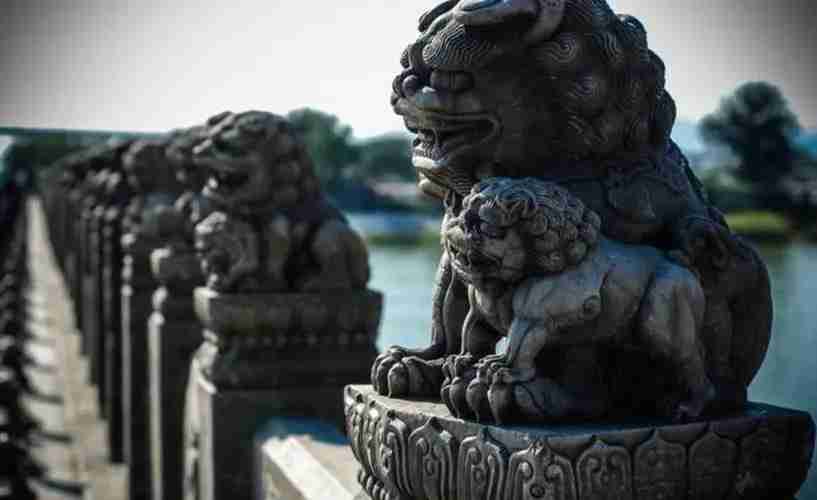
Chinese wolf vs dog
In Chinese culture, wolves and dogs hold different symbolic meanings.
Wolves are often associated with strength, courage, and cunningness. They are seen as fierce predators with a strong survival instinct. In ancient Chinese mythology, wolves were sometimes depicted as spiritual beings or guardians, and their images were often used in religious and ritual contexts. In modern times, however, wolves are often viewed as a symbol of wildness and danger, and their numbers in China have been significantly reduced due to hunting and habitat loss.
Dogs, on the other hand, have a much more positive symbolic meaning in Chinese culture. They are seen as loyal companions and guardians, and are often kept as pets. In Chinese mythology, dogs were sometimes depicted as protectors or helpers of humans, and their images were often used to ward off evil spirits. In addition, certain breeds of dogs, such as the Shih Tzu and the Pekingese, are native to China and have a special place in Chinese culture.
Overall, while both wolves and dogs are important animals in Chinese culture, they hold very different symbolic meanings and are often perceived in very different ways.
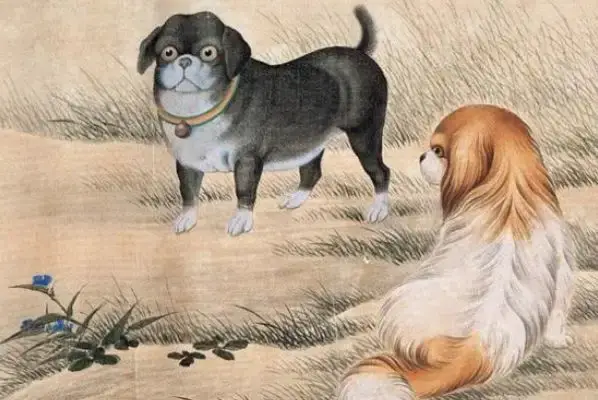
Chinese wolf vs jackal
Wolves and jackals have both been present in Chinese culture for thousands of years, and their symbolic meanings have evolved over time.
In Chinese culture, the wolf has traditionally been seen as a symbol of strength, loyalty, and perseverance. Ancient Chinese mythology tells stories of wolves helping humans in times of need, and the wolf is often associated with the qualities of courage, bravery, and resilience. In some legends, the wolf is also seen as a wise and noble creature, with a deep understanding of the natural world.
On the other hand, the jackal is often viewed in Chinese culture as a symbol of cunning, trickery, and deceit. This is partly due to its reputation as a scavenger, and its tendency to feed on the remains of other animals. In some Chinese myths, the jackal is even seen as an embodiment of evil, using its intelligence and guile to cause trouble and sow discord.
Overall, the wolf and jackal have very different symbolic meanings in Chinese culture, with the former representing positive qualities of strength and loyalty, and the latter representing more negative qualities of cunning and deceit.
Chinese wolf vs leopard
Wolves and leopards are both revered animals in Chinese culture, but they are often associated with different characteristics and symbolism.
Wolves are admired for their strength, intelligence, and loyalty. They are seen as symbols of courage, perseverance, and unity. In Chinese mythology, the wolf is often portrayed as a heroic figure that fights against evil and protects the people. The wolf is also associated with the concept of “feng shui,” which is the idea of harmonizing with nature and the universe to achieve balance and prosperity.
On the other hand, leopards are admired for their speed, agility, and grace. They are seen as symbols of power, elegance, and beauty. In Chinese art and literature, leopards are often depicted as noble creatures that represent the natural beauty of the world. The leopard is also associated with the concept of yin and yang, which is the idea of balancing opposing forces to achieve harmony and balance.
Overall, while both wolves and leopards are respected animals in Chinese culture, they represent different ideals and values.
Chinese wolf vs dragon
In Chinese culture, wolves and dragons are both important and symbolic animals, but they have different meanings and roles.
Wolves are often associated with bravery, strength, and perseverance in Chinese culture. They are respected for their intelligence, teamwork, and loyalty, and are seen as powerful protectors and guides. In some Chinese mythology, wolves are said to be descendants of the legendary Yellow Emperor, who is believed to have been transformed into a wolf after his death. In addition, the wolf is one of the 12 zodiac animals in Chinese astrology, and is associated with the lunar month of January.
On the other hand, the dragon is the most revered and powerful of all the Chinese mythical creatures. It is often depicted as a symbol of the emperor’s authority and power, and is associated with strength, good luck, and prosperity. The dragon is also a symbol of the four seasons, representing the cycle of life, and is believed to have control over the forces of nature, such as rain, wind, and lightning. In Chinese astrology, the dragon is one of the 12 zodiac animals, and is associated with the lunar month of April.
In summary, while both wolves and dragons hold important roles and symbolism in Chinese culture, their meanings and representations are distinct from one another.
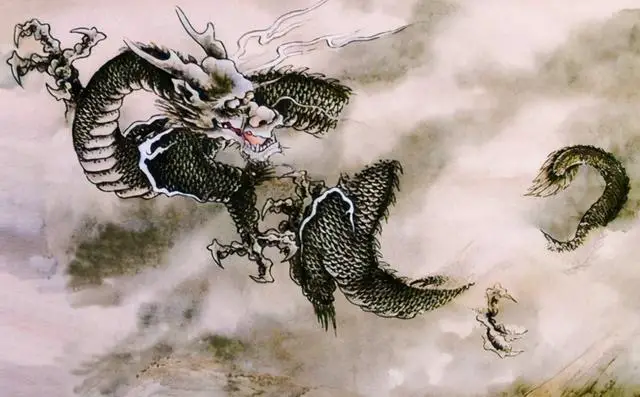
wolf vs taotie
In Chinese mythology, both the wolf and the taotie are considered as ferocious creatures. The wolf is often associated with courage, strength, and endurance, while the taotie is known for its insatiable appetite and insidious nature.
The taotie is typically depicted as a grotesque, gluttonous beast with a gaping mouth and bulging eyes, often found on ancient Chinese bronze vessels. It is said to represent greed, and the desire for wealth and power. The wolf, on the other hand, is often depicted as a loyal and protective animal, and is sometimes associated with the concept of filial piety.
In terms of a direct comparison between the two, it is difficult to say which one would come out on top, as they have very different characteristics and strengths. The wolf’s ferocity and agility would make it a formidable opponent in a physical confrontation, while the taotie’s cunning and insidious nature would make it a formidable opponent in a battle of wits. Ultimately, the outcome would depend on the specific circumstances and context of the situation.
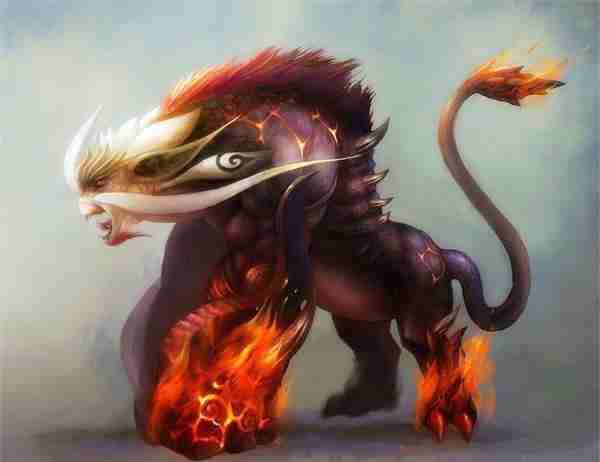
wolf vs qilin
Wolves and qilin are both important animals in Chinese culture, but they have very different connotations.
Wolves are often associated with strength, bravery, and cunning. They are seen as symbols of the wilderness, and are admired for their ability to survive and thrive in harsh environments. However, they can also be seen as dangerous and aggressive, and are sometimes associated with negative qualities like greed and treachery.
In contrast, qilin (also known as “kirin” or “Chinese unicorn”) are mythical creatures that are considered symbols of good luck, prosperity, and harmony. They are often depicted as gentle and benevolent, and are said to appear only during times of peace and prosperity. Qilin are also associated with wisdom, righteousness, and knowledge.
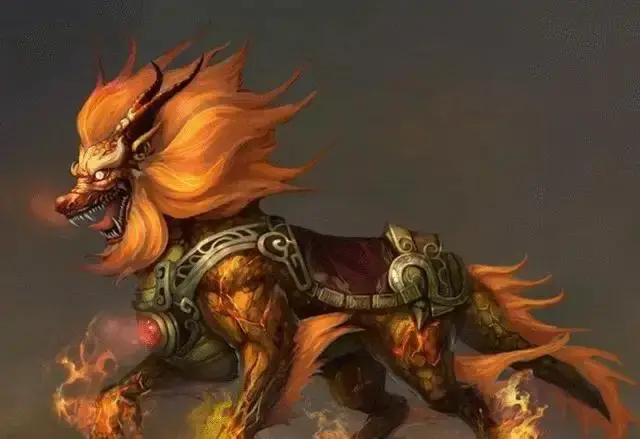
Chinese wolf vs viking wolf
As previously mentioned, the concept of a “Chinese wolf” and a “Viking wolf” may refer to different things. However, in terms of comparing the two, we can look at the cultural symbolism and mythology surrounding the wolf in each culture.
In Chinese culture, the wolf is traditionally seen as a symbol of courage, loyalty, and protection. It is often associated with the idea of a “Wolf soldier” as a brave and dependable warrior who defends their homeland. In Chinese mythology, there are also tales of heroic wolves who protect their families and communities.
In Viking culture, the wolf was also a significant symbol, but it was often associated with ferocity and cunning. The Vikings saw the wolf as a predator that was skilled in hunting and surviving in harsh environments. In Norse mythology, the god Odin had two wolves as companions, and warriors would sometimes adorn themselves with wolf skins to invoke their strength and protection. The Viking wolf is often portrayed as a fierce and powerful creature, embodying the warrior spirit and the harsh realities of life in the Viking Age.
conclusion
In conclusion, the wolf is a symbol of great significance in Chinese culture, representing strength, power, loyalty, teamwork, and spiritual beliefs. Its presence in Chinese art, literature, and folklore serves as a reminder of the importance of these values and the way in which they can help individuals and communities to overcome challenges and achieve their goals.